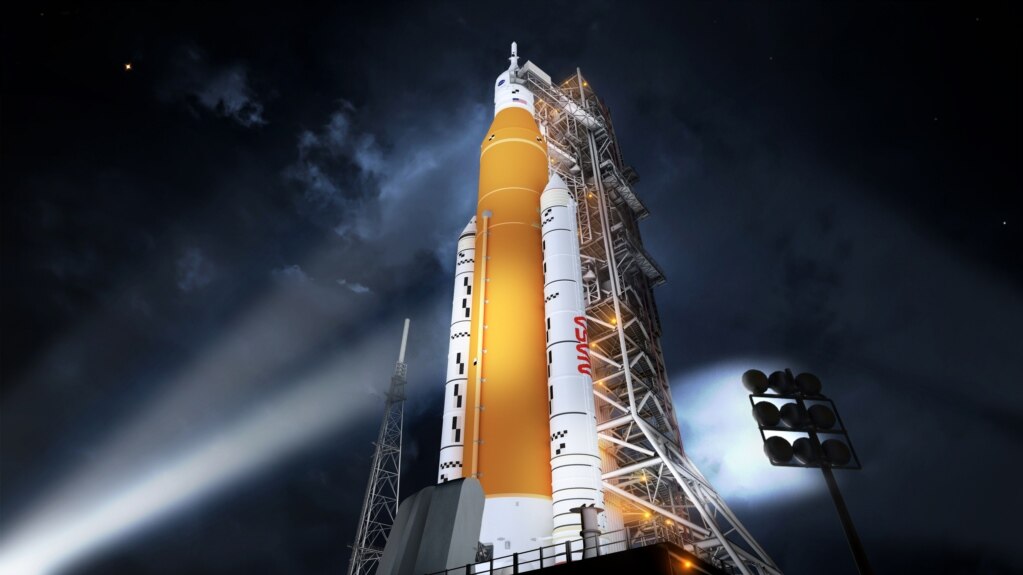A series of new space missions are planned for the coming year. Here is a look ahead at some of the ones to watch out for in 2024.
Artemis II
The American space agency NASA launched its first flight in the Artemis program in 2022. That mission, called Artemis I, sent the Orion spacecraft on a trip to fly around the moon.
Artemis aims to return astronauts to the moon for the first time since NASA’s Apollo 17 mission in 1972.
Artemis I was a test of the Orion spacecraft, or capsule, as well as NASA’s huge Space Launch System (SLS) rocket that carried it into space. That mission sent Orion more than 400,000 kilometers away from Earth and completed a close fly-by of the moon. NASA officials declared Artemis I a huge success.
NASA plans to launch Artemis II in late 2024. It is expected to take the same path that Artemis I took around the moon, but this time it will be carrying four NASA astronauts aboard Orion.
NASA says Artemis II aims “to confirm all of the spacecraft’s systems operate as designed with crew aboard in the actual environment of deep space.”
Moon lander launches
While Artemis II will not complete a landing, several other lunar landers are expected to touch down on the moon’s surface in 2024.
The first of these launches is planned for January 8. It involves a lander named Peregrine. The 1.9-meter-tall spacecraft is made by the private, American space company Astrobotic Technology. It will launch aboard a Vulcan Centaur rocket, made by United Launch Alliance (ULA).
Peregrine is expected to carry 20 research experiments to the moon for seven countries. It will aim to land in an area known as Sinus Viscositatis. NASA says the area sits next to the Gruithuisen Domes, the largest dark spot on the near side of the moon.
Another Astrobotic lander, called Griffin, is set to launch to the moon’s south pole in late 2024. It will be carrying an exploring robot, or rover, called VIPER. VIPER is designed to search for water sources on the moon.
In addition to those, American space company Intuitive Machines is providing two landers to NASA expected for launches next year.
Japan will also attempt to become the fifth nation to reach the surface of the moon in mid-January. The country’s space agency launched the spacecraft, called SLIM, in September. SLIM’s mission goal is to test the possibility that spacecraft can land on very specific targets.
ESA’s Hera mission
The European Space Agency (ESA) plans to launch its Hera spacecraft in October on a mission to return to an asteroid system visited by NASA's DART spacecraft in 2022. Hera is designed to collect data on the targeted system, called Didymos. The spacecraft is expected to closely examine the physical properties of Didymos and measure detailed effects of DART’s crash.
Europa Clipper
NASA hopes to launch its Europa Clipper mission in October. This orbiter is designed to carry out close examinations of Jupiter’s moon Europa. Specifically, the mission will look for signs that the icy moon might hold the right conditions to support life. NASA says the orbiter will fly in orbit around Jupiter and “perform repeated close flybys of the ice moon.”
Boeing’s Starliner test flight
NASA and Boeing have said they plan to launch the first crewed test flight of the company’s Starliner spacecraft. NASA says it is targeting March 2024 to have Starliner ready for flight. A launch date is to be set later.
The spacecraft completed its first uncrewed flight test to the International Space Station (ISS) last May. But Boeing has experienced several technical difficulties with Starliner during the mission and has worked with NASA to fix the problems as it prepares for the planned crewed flight.
SpaceX Starship test
SpaceX, another NASA partner, has been successfully using its rockets and spacecraft to transport astronauts and materials to the ISS since 2020. But the company will be seeking a successful test flight in 2024 for its super-heavy Starship spacecraft.
SpaceX experienced two failed Starship tests in 2023 – one in April and the other in November – which resulted in explosions. The April blast caused major damage to the launch structure in the state of Texas. SpaceX has said it has been examining the issues related to the explosions and plans to carry out another test of Starship as soon as possible. But it will have to wait until the U.S. Federal Aviation Administration (FAA) completes its investigation of the launch site damage and approves a new test.
I’m Bryan Lynn.

